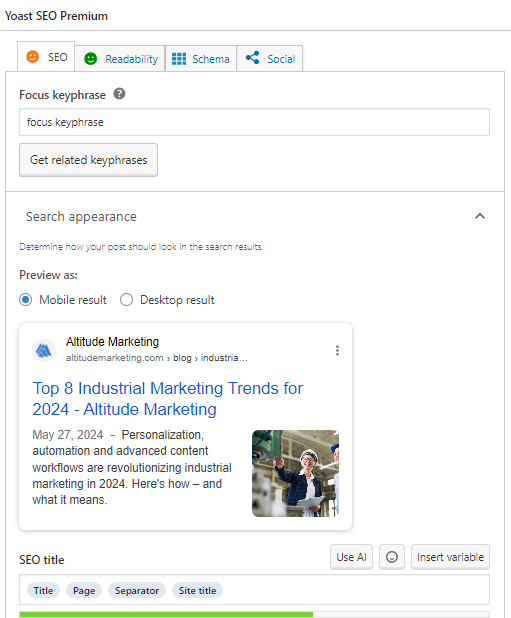Note: This blog was updated January 2025.
If you work in anything marketing-related, you’ve definitely heard of Yoast SEO, the most popular search engine optimization plugin for WordPress.

How to Pick the Right Yoast Focus Keyphrase
Frankly, it’s an incredible tool for B2B marketers. (There’s a reason it has 5+ million active installations and has been downloaded more than 202 million times.)
With that sort of popularity, you’d be shocked at how often the SEO plugin’s features go misunderstood.
Chief among them: the focus keyphrase input field. You know, this guy:

But What is a Yoast Focus Keyphrase?
The focus keyphrase (it used to be “focus keyword”) is a Yoast-speak for the term or phrase that you want a page or post to rank for most on search engines.
Basically, when people search for that term or phrase, you want them to find you.
Unfortunately, the purpose of the focus keyphrase is often misunderstood. Let’s explore two of the most enduring mistakes marketers make when choosing a focus keyphrase.
Myth #1: Selecting a focus keyphrase optimizes your SEO toward that keyphrase
This couldn’t be more false.
Here’s the actual truth: On a page-by-page level, Yoast is reliant on the user to pick a focus keyphrase. It does not auto-suggest a list of keyphrases that it thinks best matches the content of your page or post.
Furthermore, when you enter a focus keyphrase, Yoast does not optimize your content to rank for that term.
Instead, it judges your content based on what you entered. If I’d chosen “Yoast” as the focus keyphrase for this post, it would turn up green.
(People love to get “all green” in Yoast.)
It also would have been worthless. Why? That leads us to the next myth …
Myth #2: Your focus keyphrase should be what your page or post is about
When plugging keyphrases into Yoast, many users assume the keyphrase should be what that page or post is about. This is a very common misconception … and it’s dead wrong.
Your focus keyphrase is not what your post is about. It’s what your post is perfect for.
Why? Because when you choose a focus keyphrase, you are basically claiming “This is the best post in the world about this.”
Say you write a blog post about the best climate for growing Valencia oranges. If you choose “oranges” (or even worse, “climate”) as your keyword, you’ve picked a very poor one; there are thousands of posts out there that discuss oranges and climates much better than yours.
That applies to pretty much any subject. Whatever you write will not be the best post or page in the world about that subject. And that’s fine!
It’s not about being the best in the world. It’s all matching search intent.
What is Search Intent?
Search intent, sometimes also known as keyword intent, is the ultimate goal of the person using a search engine. People look for and use search results differently based on their ultimate goal. Understanding and optimizing for search intent is hugely important for SEO purposes.
Here’s a practical example of search intent: If you google “Ford Mustang,” the first few results will be from someone (Ford itself or car dealerships) trying to sell you a Ford Mustang.
But if you search “Ford Mustang 0 to 60”, you will see content about the 0 to 60 specs for the Ford Mustang.
That difference represents search intent, or what the person who is entering the search query is actually looking for.
Say you’re writing a post about the 0 to 60 times for the 2020 GT Ford Mustang – yes, it is technically about the Ford Mustang. But the people who simply search “Ford Mustang” are probably looking for information on where to purchase a Ford Mustang.
Instead, the focus keyphrase “0 to 60 Ford Mustang” is much superior at mirroring the search intent of users who are trying to find information about the 2020 Ford Mustang’s specs … which your post should have!
Bottom-line: Think beyond what your page or post is “about.” Start considering what specific question it answers or what search intent it is perfect for.
So what does the Yoast focus keyphrase actually do?
All Yoast can do is say how good of a job you did of optimizing for your chosen focus keyphrase on that page. Yoast does not read your text and make judgments based on a comprehensive and critical-thinking analysis.
Essentially, it scores based on the presence of your focus keyphrase in the title or meta description and how often it appears in the text – very simple stuff!
So no, Yoast won’t tell you what to write about, what focus keyphrase to use, or how “good” of an SEO job you did … only how good of a job you did optimizing your post for your focus keyphrase.
Here’s the takeaway: The focus keyphrase is not the subject of your post. It’s what your post is perfect for. And making your post perfect for something is your job, not Yoast’s.



